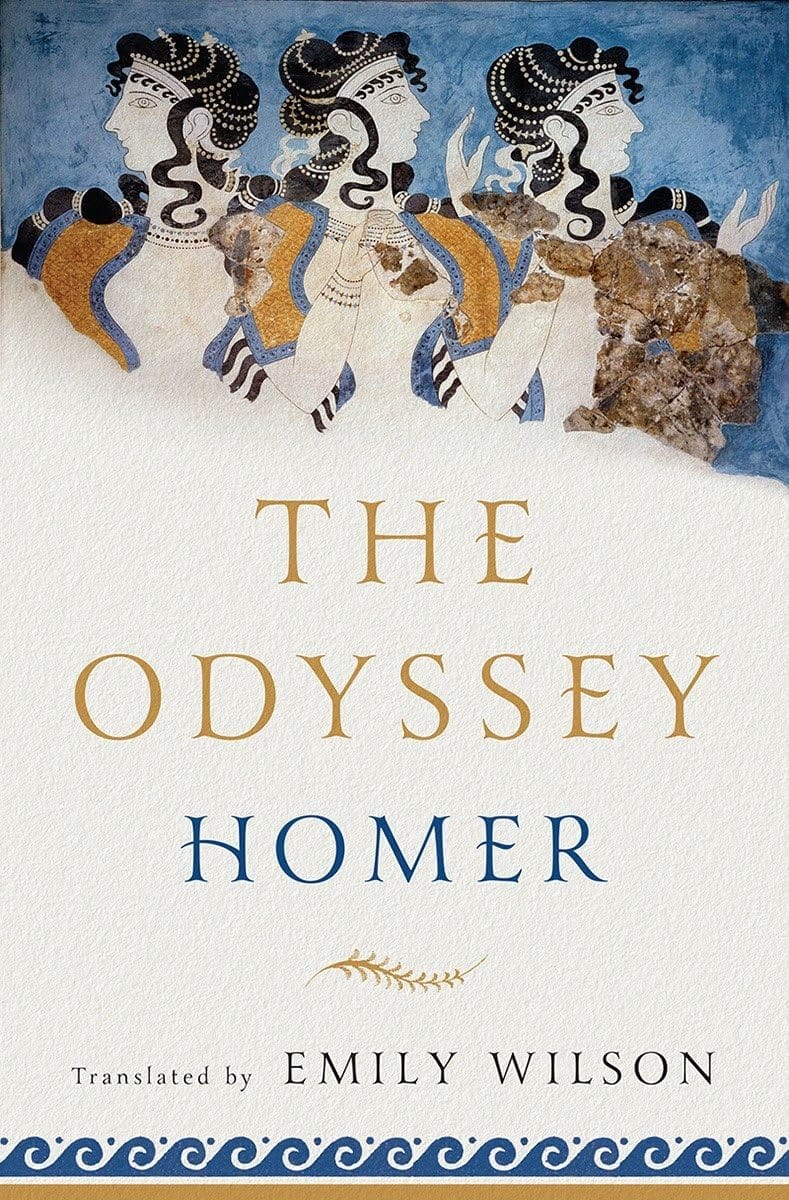Book of the Month: THE ODYSSEY by Homer, translated by Emily Wilson
Tell me about a complicated man.

A few months ago, I wrote an article on this blog spotlighting a prose translation of the Iliad that I found on Project Gutenberg. Now, for this Book of the Month, I've decided to take another trip back to mythic Greece in order to spotlight a modern translation of Homer's other epic poem in the Trojan Cycle—a work even more iconic and influential than its predecessor.
The mythical story of the Trojan War does not end once the Greek armies have sacked the city of Troy. As I allude to in my article on the Iliad, many of the Greeks' military commanders face hardships and disaster while trying to make their way home from the war. But none of them had a longer and more perilous return trip than Odysseus, king of Ithaca and the most clever strategist in the Greek army. When his tricks and deception incur the wrath of the god Poseidon, Odysseus and his crew find themselves blown off-course into wild, magical unknown territory. So begins a sprawling, decade-long journey across the sea as Odysseus attempts to get back to his family and his kingdom. Along the way, he takes part in some of the most famous scenes from Greek mythology—the escape from the cave of the man-eating Cyclops, the witch Circe transforming her visitors into pigs, the tempting songs of the Sirens and the challenge of sailing between the sea monster Scylla and the whirlpool Charybdis. Meanwhile, back on Ithaca, Odysseus's wife Penelope and son Telemachus attempt to fend off the many suitors who have come to court the queen and take the family's wealth for themselves. So even when Odysseus finally does return to Ithaca, he is met with the most important challenge he's ever faced: reclaiming his rightful place in life from those who would steal it from him.
The Odyssey, like the Iliad, is one of the oldest surviving works of literature and a foundational entry in the Western literary canon. Likely composed in the 8th century BCE, its influence now extends far beyond its original performers and audiences in the ancient Greek world. In fact, it's difficult to say just how influential the Iliad and the Odyssey are on the development of Western literature and culture because they are embedded in the very framework of that culture; it would be impossible to extricate them from the landscape that they helped create.
Storytellers have always loved the Odyssey in particular. By taking "slices from the banquet of Homer," to borrow a phrase from Aeschylus, writers have given life to the genres of fantasy, science fiction and modernism, to name just a few. James Joyce sent Odysseus to 1920s Dublin, and the Coen Brothers sent him to Depression-era Mississippi. An obscure anime called Ulysses 31 even sent him to space. Feminist authors like Margaret Atwood and Madeline Miller have reimagined the story by shifting focus to some of the poem's fascinating female characters. In recent years the Odyssey has even gone viral on the Internet as a musical concept album, and next summer, Christopher Nolan will be cashing in his "I finally won Best Picture" clout to bring an epic new film adaptation of the story to the big screen.
It's clear that the tale of Odysseus continues to enthrall and inspire humanity right up to the present day. But how well do us modern folk really know this story? How well do we understand the enigmatic man at its center? And how can we recognize and contend with the multifaceted, often troubling ideologies in this text that is our collective inheritance as people?
Enter Emily Wilson, a British-American classicist who's been writing and teaching about the influence of ancient Greek and Roman culture since the early 2000s. Although her authorial career began with nonfiction texts, Wilson is best known for her translations of ancient Greek and Roman literature. Her interpretation of the Odyssey was met with great fanfare and scrutiny upon its publication in 2018, since it was the first known English translation of the poem by a woman. But while Wilson's perspective as a woman does contribute to how she approaches this material, it's only one of the many pieces and layers that make up her Odyssey. The goal of this translation is to tell Odysseus's story in a way fit for the 21st century—not by updating the setting or fully modernizing the language, but by showing the plot and characters in all their complex glory and helping readers both understand and criticize the cultural beliefs of the ancient Greek world.
Alexander Pope's influential translation of the Odyssey, published in the 1720s, begins like this:
The man for wisdom's various arts renown'd,
Long exercised in woes, O Muse! resound…
Robert Fitzgerald's 1961 translation, quoted in the opening of O Brother, Where Art Thou, begins like this:
Sing in me, Muse, and through me tell the story
of that man skilled in all ways of contending,
the wanderer, harried for years on end…
And Wilson's translation begins like this:
Tell me about a complicated man.
Muse, tell me how he wandered and was lost
when he had wrecked the holy town of Troy…
The difference is stark, almost a bit startling, and that is very much by design. One of Wilson's goals for this translation was to strip away all the dense, flowery language that modern readers associate with Homer, stylistic choices built up over centuries' worth of prior English translations. So instead of careful rhymes and lyrical word choices, the story unfolds in plain, straightforward vocabulary that makes it more accessible to readers who may not have encountered Homer before.
It's not a prose translation, though. Wilson takes the dactylic hexameter used in the original ancient Greek text—six feet per line, composed mainly of a long syllable followed by two short syllables—and translates that into the more familiar rhythm of iambic pentameter, which is five feet per line alternating between unstressed and stressed syllables. The result is that Wilson's translation has a clear and steady beat throughout, one that readers can pick up on and fall into with minimal effort. It also has the exact same number of lines as the original text (about twelve thousand), an impressive feat in and of itself.
But what gets me about that first line is how brilliantly it sets up the central theme of Wilson's Odyssey. "Tell me about a complicated man." The first thing we're told about Odysseus is not his renown or his skill; it's his disquieting ambiguity and the way his true nature is difficult to pin down. Odysseus is one of the most enduring characters in Western literature because he's such a multifaceted figure open to interpretation. Is he a great hero or a conniving villain? An explorer or a marauder? A clever trickster or a compulsive schemer? Is his return to Ithaca a triumphant reclaiming of his birthright or a violent, traumatic conquest? For Wilson, he is all of these things and more. Her Odyssey shows readers all the virtues and flaws of its protagonist, as well as the varied impacts that his influence has on the world and characters around him.
Wilson's Odysseus is a violent character, often needlessly so. At a key point in the poem, when he begins to tell the story of his ten-year voyage, he mentions coming across a seaside town shortly after leaving Troy:
A blast of wind pushed me off course towards
the Cicones in Ismarus. I sacked
the town and killed the men. We took their wives
and shared their riches equally among us.
In the text itself, this act passes without comment. Wilson notes that "it is presented simply as the kind of thing Odysseus does, or perhaps the kind of thing that any Greek man would do, given the chance." But it's difficult not to see the sacking of this innocent town as the story's first instance of Odysseus leaving bloody destruction in his wake as he makes his journey home. It's an angle that Wilson wants her readers to at least consider, and one that she emphasizes with careful word choices in her translation.
Take, for example, the famous section in which Odysseus outwits the fearsome, man-eating Cyclops. In this translation, that book is titled "The Pirate in the Shepherd's Cave." Those monikers alone urge us to view the following scene as something more complex than "a hero versus a monster." While the events of the scene remain unchanged, Wilson brings out the sinister undercurrents in Odysseus's behavior. He and his crew essentially break into another man's dwelling, demand treatment in accordance with the Greek rules of hospitality despite being in a foreign land, then respond with violence and robbery when the Cyclops treats them like intruders—which, from his perspective, they are. And the description of how Odysseus blinds the Cyclops is quite graphic, emphasizing how agonizing it would feel to have a smoldering wooden stake shoved into your eye. Odysseus's joy over tricking the Cyclops and the subsequent taunts he hurls towards him read as not just boastful pride, but outright sadism. It's a sequence that can make you reconsider whether or not Odysseus returning to his kingdom would actually be a good thing.
But for each aspect of Odysseus that makes him difficult to understand and sympathize with, Wilson shows us a piece of his vulnerable humanity. More than anything else, the Odyssey is a story about characters dealing with catastrophic loss. The world as a whole is living in the shadow of a massive war that killed countless men, and its aftershocks are still being felt a decade after the sacking of Troy. On a personal level, Odysseus's son Telemachus is emotionally stunted and lacking self-confidence from growing up without a father figure in his life. Odysseus's wife Penelope mourns the disappearance of her husband and tries to remain faithful to him despite the intense pressure on her to remarry. And then there is Odysseus himself, a man who's been broken by two decades of warfare and misery. The modern conception of PTSD obviously did not exist when the poem was first created, but it's not difficult to see its symptoms in the character of Odysseus. And why wouldn't he be traumatized? He's witnessed the deaths of every man that set out with him to war, not only in that war but on the return trip. He spends seven whole years as a prisoner of the goddess Calypso, who forces herself upon him each night. We're told that he spends each day on Calypso's island staring out at the sea and crying, and that's how he's introduced into the story. Perhaps the most fascinating manifestation of his trauma comes from how he reacts to hearing a poet sing about the destruction of Troy:
Odysseus was melting into tears;
his cheeks were wet with weeping, as a woman
weeps, as she falls to wrap her arms around
her husband, fallen fighting for his home
and children. She is watching as he gasps
and dies. She shrieks, a clear high wail, collapsing
upon his corpse. The men are right behind.
They hit her shoulders with their spears and lead
her to slavery, hard labor, and a life
of pain. Her face is marked with her despair.
In that same desperate way, Odysseus
was crying…
There's a lot that's open to interpretation about this passage here. Is Odysseus weeping only for himself, remembering all the terrible things he's seen over the past twenty years? Or is he also weeping for the victims of his own actions in Troy? His true feelings, like the rest of his character, are difficult to pin down.
But there's one aspect of Odysseus that's not shrouded in ambiguity. In fact, it might be the most honest thing he says in the whole poem, and it's this:
"I miss my family. I have been gone
so long it hurts…"
That simple admission there cuts right to the heart of what makes the Odyssey such an enduring narrative. For all his flaws and alien behavior, Odysseus's core desire—to get back to his home and family—is something that all of humanity can relate to. We root for him to achieve his goal because we can place ourself in his shoes and consider what we'd do in his situation. That specific longing is the key to the whole narrative. If Odysseus was merely sailing in search of treasure and glory, we might see his actions as unjustifiable. But that underlying universal need for a place to belong sheds light on the ruthless and scheming aspects of his personality. It's precisely what makes him such a complicated man, and it's why we still tell his story today.
Emily Wilson's translation of the Odyssey is a rich and layered text that modernizes Homer's language while preserving the epic scope and intricacy of this ancient narrative. As a companion to the poem itself, I highly recommend you also read Wilson's introduction to her work and her translation notes: she covers the themes of the story in much greater detail than I can do here, unpacking additional topics like the presence of slavery in the characters' world, the treatment of women and the importance of xenia, or "guest-friendship." With her full analysis, you'll have a much deeper understanding of and appreciation for the material.
No matter what your level of familiarity is with the Odyssey, this particular translation is well worth reading. If you're encountering the story for the first time, this is a perfect place to begin. If you already know the story, then Wilson's language and perspective will help you experience it in a new, thought-provoking way. In short, this is a journey well worth taking.
Come back in September to see my next Book of the Month pick!
—Dana




